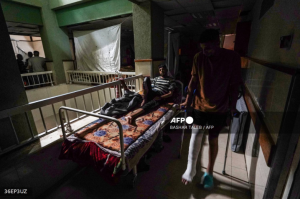
In the northern Gaza Strip, hospitals are facing a dire crisis as fuel shortages and power outages threaten the lives of vulnerable patients, particularly those in incubators and intensive care units.
At the Kamal Adwan Hospital in Beit Lahia, doctors are forced to use mobile phone torches to navigate the dimly lit corridors, as the hospital’s generators have stopped functioning due to lack of fuel. Dr. Mahmoud Abu Amsha warned that the fuel shortages could soon prove deadly, as “children in the incubators are threatened with cardiac arrest and death.”
The situation is not limited to Kamal Adwan Hospital. Other medical facilities, such as Al-Awda Hospital, have also been forced to close some services and postpone operations due to the fuel crisis. Mohammed Salha, the acting director of Al-Awda Hospital, stated that the hospital is “desperately waiting for a fuel delivery to restart its generators,” as the lack of fuel “puts the sick and wounded at risk.”
The ongoing fuel shortages in the besieged Gaza Strip are a consequence of the more than 10 months of war that have ravaged the region. The conflict, which began with Hamas’s attack on southern Israel in October 2022, has left Gaza’s 2.4 million residents struggling to access basic services, including healthcare.
The war has also taken a heavy toll on Gaza’s already fragile infrastructure. The territory’s only power plant stopped working during the initial days of the conflict, and Israel’s retaliatory strikes have further disrupted the electricity supply. As a result, hospitals have had to rely on generators, which are now at risk of shutting down due to the fuel shortage.
Ayman Zaqout, a patient at Kamal Adwan Hospital, expressed his concerns about the situation, saying, “There was no electricity and I don’t know how they will be able to treat me in these circumstances.” This sentiment is shared by many in Gaza, as the lack of basic services threatens the well-being and lives of the most vulnerable.

